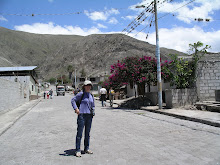



Dear Readers,
As is apparent from some of the photos, we are excited about potatoes. Being the main staple of the Sierra diet here, we want to see if we can plant and grow them organically.
Lucy and I are teaching classes here at the foundation every Monday and Wednesday afternoon. As in the U.S., it is challenging to get young people interested in agriculture. They are more interested in becoming consumers with a 9 to 5 job in urban areas. But we were able to motivate some of the younger ones to climb the steep hillsides with us. Two teen age girls (as is common in the kichwa culture), were proud to show us how much compost fertilizer they could carry. Aside: I am still blown away by the tenderness and care men show toward children, and the physical prowess women proudly exhibit in this culture.
So the potatoes are in the ground in expectation of the heavier rains to come.
A couple of weeks ago we made a trip to Quinche outside of Quito to check on a goat farm we heard about. Carlos, 80 years old, full of energy and still passionate about agriculture, showed us around his impressive farm with more than 100 goats. We came away more determined than ever to initiate a goat project here in San Bernardo. The people here, including our counterparts are starting to warm up to the idea. We are talking about starting with 3 or 4 families, each of which would receive a pair of young pregnant females. The families would have to invest labor and some materials in building a small stable, corral, feeders, and milking stand. The first female offspring would have to be returned to the project to be presented to new families. Currently I'm calling the project, Milk for "Kids". A good buck goat (check out the Chilean bucks in the photo) will be kept for breeding purposes at the foundation.
We are applying to the Peace Corps to be approved as a Partnership Program. This approval would mean we will be listed on their website and people will be able to donate directly to the project there at http://www.peacecorps.gov/. Of course our friends at Farmer to Farmer (http://www.farmertofarmer.org/) will certainly expedite any support for this goat project also.
Yesterday I indulged in a little beekeeping with our counterpart, Jose Pilamunga. At one point he said I was covered with about 1000 africanized bees - which means they are very aggressive but also hardy and resistant to disease. On inspection, one hive needed to be harvested so we took out about 9 liters (worth about $5 per liter here). No stings for me but 2 for Jose. A few of these little buggers waited around 10 minutes until he took off his protective equipment, and zapped him!
Didn't mean to write a book but we are staying busy. Nine of our original training group of 43 have returned home, most because they weren't happy here. Certainly life in a strange culture can be lonely....less so for married couples like Lucy and me. Maybe there's a lesson here about trying to find happiness in external circumstances......
Anyway, may you be happy and know the root of happiness,
Craig
